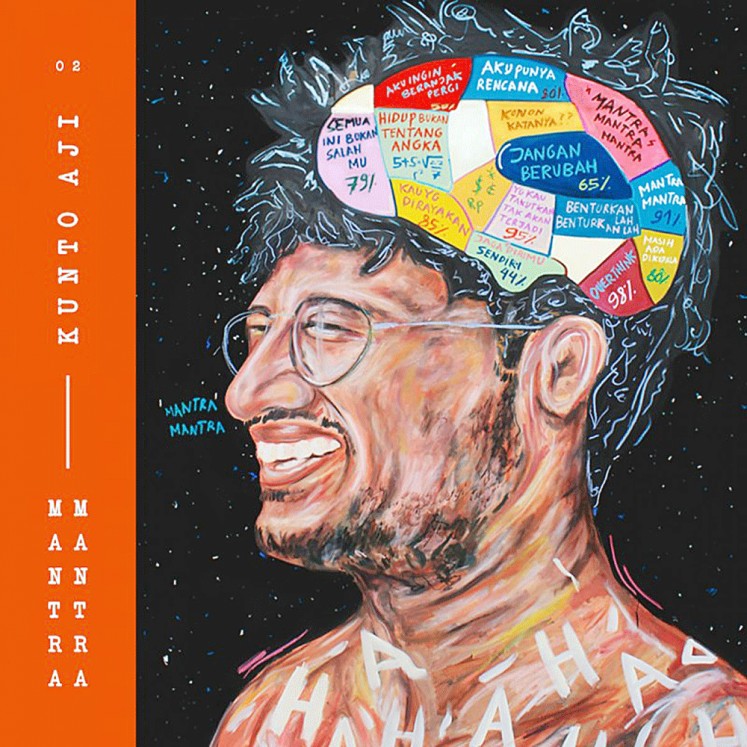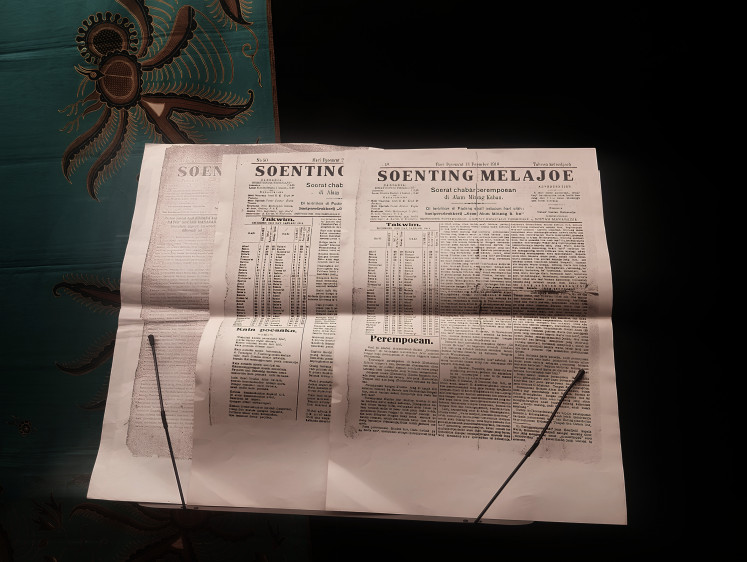Kunto Aji's revolution against himself within the new mainstream
Change text size
Gift Premium Articles
to Anyone
 Kunto Aji (Courtesy of Juni Records/-)
Kunto Aji (Courtesy of Juni Records/-)
M
usician Kunto Aji delves deep into his own psyche to address his vulnerabilities and face the obstructive thoughts that have plagued him in his second album, Mantra Mantra.
Kunto’s second album comes three years after his first album, Generation Y, and the level of anticipation, for the positive response to and the mechanisms behind how Mantra Mantra was created and distributed also show that he is a successful example of a new kind of mainstream that has risen within an industry driven mainly by young creators who now dictate the public’s taste.
Kunto’s music in Mantra Mantra is youthful, hip and molds well and easily into ears. If one were to choose corners to describe his music, he would be a sort of Bruno Major pop-soul crooner swimming through reverbed beats and melancholy melodies that sonically depict the feelings of overthinking and doubt.
The themes explored in his second album display honesty and admissions of weakness, topics that are seen more often in today’s music. No longer do young artists have to deal with the burden of putting on a strong face when they honestly cannot.
Here, Kunto lays bare his full self, his admissions of overthinking and the ways it affects him in various aspects of his life, thereby presenting himself as an honest human being. Back in the day, pop stars used to be told by label executives to project an image that put them high on a pedestal, thus making them appear indestructible but putting them out of reach from their fellow man. Today’s stars employ the opposite track of just being themselves, and do so to wonderful responses and a higher level of self-contentment.
This kind of honesty is the one thing that many major label Indonesian artists lack, be it of their own choice or because of the directions of their overbearing label bosses. Compared to when he was fresh out of participating in Indonesian Idol back in 2008, it is now in this free environment that he is able to truly break out as an artist.
Kunto’s success and his independent result and content finish is a result of a new mainstream music movement predominantly in urban Jakarta, driven by creators and passionate sympathizers.
The cliché of the corporate major label record contract no longer feels relevant or even attractive anymore to artists like him, and thus artists such as Kunto are able to break out into the scene, miles away from the rigid Indonesian Idol structure, with little to no compromise to their identities in order to hustle and fight for what they want.
This youthful, fresh movement is slowly usurping the roles of obsolete major labels that once used to call most of the shots in the music industry; establishing themselves as the new major labels.

Aside from Kunto, some of the producers of Mantra Mantra are also products of this new mainstream, such as Petra Sihombing and Bam Mastro. Musically, both men click very much with Kunto’s style and their touches bring out subtle extras to the songs they worked on, especially Bam Mastro’s ambitious and distinctive hip-hop flavors given on the track “Saudade”.
Kunto admits that this album took a long time to complete, due to several delays that occurred and also with his own struggles with overthinking and self-esteem issues. But to tackle those issues, the artist says he credits the presence of others as one remedy toward feeling better.
“I am trying to highlight one aspect of mental health that tends to be overlooked and dismissed by many, which is overthinking,” he said.
“This happens to me a lot and that’s why it took a long while to finish the record.”
The artist admits that he has self-doubt issues that used to hinder him from carrying out everyday activities, and also affected the pace at which he made his music. So much so that a month before Mantra Mantra was released, he released a small EP made up of demos for the current album, fittingly called Overthinker EP, as a small answer to the pressure of finishing his album.
The first single, “Topik Semalam” (Last Night’s Topic), was chosen by Kunto mainly because it is representative of what he is trying to convey about his struggles with obstructive thoughts, and the value of those around him who want him to see outside of his negative thoughts.
To cope with such feelings, visits to the psychiatrist have helped him, and through processes like these he gradually found his answers toward getting better. With the support of a wife and an encouraging circle of friends, as well as a shoulder on his spirituality, Kunto managed to then complete his album one step at a time.
“I feel better when I talk about these problems with people I’m not really close with, or even strangers, hence the psychiatrist,” Kunto said.
“Because for me, it’s easier to vent yourself to a stranger because you tend to not really care about what they think about you compared to how much you care about your loved ones’ opinions. But again, everyone who’s dealing with this handles it differently.”
“I’m just glad [the album] is out already but will it stop the overthinking? I hope so.”









